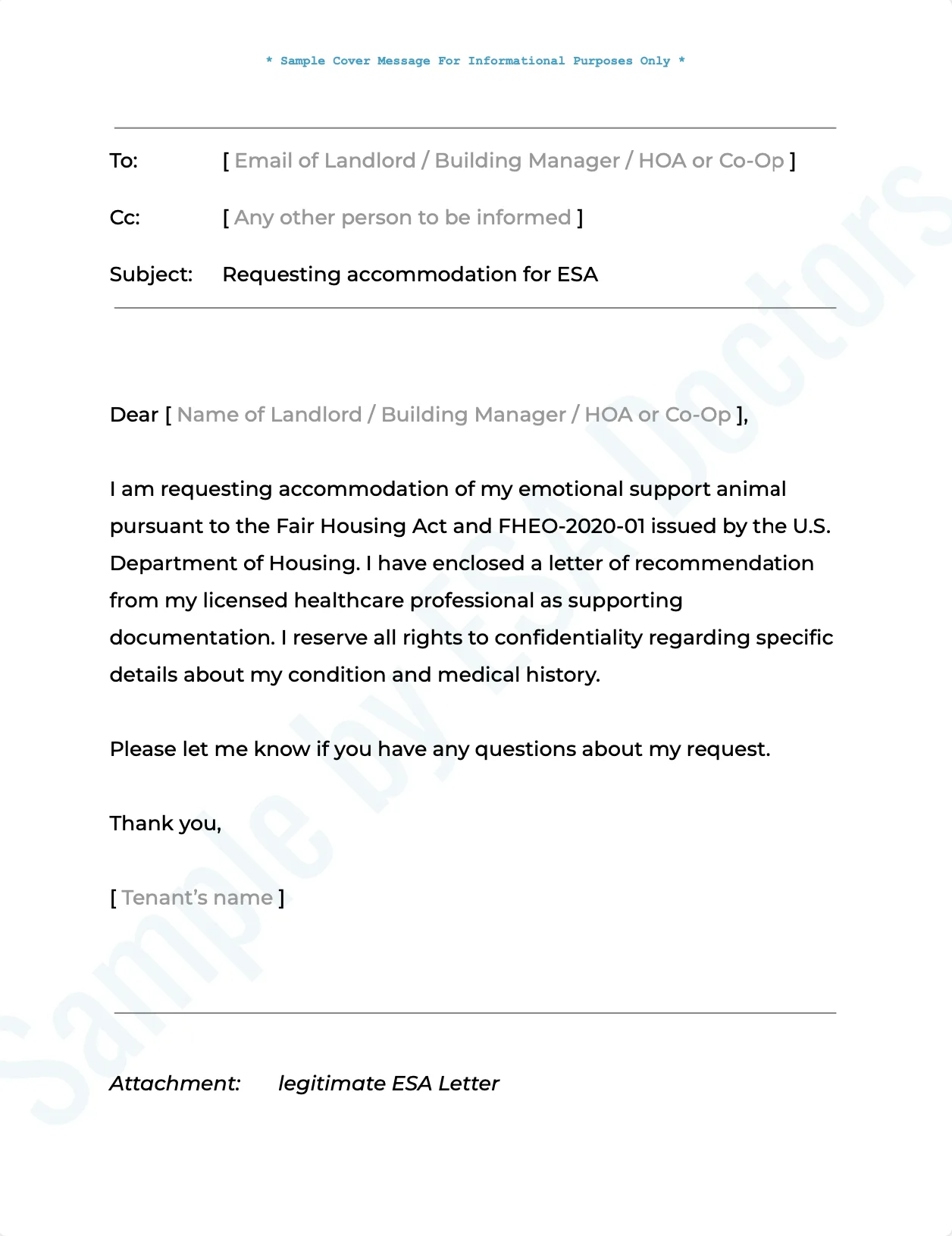You can inform your landlord you want to live with an emotional support animal by giving them an ESA letter. You do not need to submit any other forms, but you can include a simple cover message like the one below, if you wish. It can also help to have a brief conversation with your landlord before sending your documents.
Here are three steps for telling your landlord you have an ESA: 🏡
- Preview your ESA with a quick talk. If you’re comfortable talking to your landlord, it can help to have a quick discussion before sending your ESA letter. Your landlord may appreciate the heads-up and be more receptive to your ESA letter if they know it’s coming.
- Send your ESA letter via email. HUD advises tenants to keep a copy of their ESA request in case there’s a dispute later. Communicating by email ensures a digital trail is showing when you sent your request.
- If you want, include a cover message. If you wish, you can send your ESA letter with a brief cover note in your email. Below is an example of a cover message you can include.
Many new ESA owners are understandably anxious to inform their landlords about their emotional support animal. Especially if they live in a building that doesn’t allow pets or have signed a lease stipulating no pets. But keep in mind that the Fair Housing Act is on your side — you have a legal right to have your emotional support animal!
When requesting accommodation for your ESA, be friendly but firm. If you have a valid ESA letter, you can proceed confidently, knowing you’re backed by housing laws. Most ESA owners who are nervous about sending an ESA letter find the process easier than expected.
That’s because most landlords are more than happy to accept emotional support animals, especially when the tenant has done the right thing and included a legitimate ESA letter with their request.

Frequently Asked Questions About Informing Your Landlord About Your Emotional Support Animal
When should I tell my landlord about my ESA?
The timing of when to tell your landlord about your ESA can be tricky, but we recommend informing your landlord as soon as possible. While you do not have to disclose your ESA while signing your lease, we think it’s a good idea so they don’t feel blindsided later and you remain on good terms with them.
You’re allowed to disclose your ESA at any time — before you move in, after you sign your lease, after you adopt your ESA, etc., but as soon as you have your ESA letter, you should give your landlord a heads up. Remember, with an ESA letter, the law is on your side! Don’t be afraid to ask for something that is your right to have.
What documents should I have ready before telling my landlord about my ESA?
The most important thing to have when informing your landlord about your ESA is an ESA letter you can trust will work. To qualify for an ESA letter, you must have a condition like depression, anxiety, or PTSD that affects your ability to perform major life activities. It is up to a licensed healthcare professional to evaluate whether an emotional support animal can help you, and they are also the only ones legally allowed to write ESA letters.
If you want an ESA letter that you can confidently give to your landlord, ESA Doctors work with healthcare professionals who are licensed for your state and are pros at writing ESA letters. They’ll support your right to have an emotional support animal with a signed ESA letter just for you that contains their license and contact information in case your landlord wants to check their credentials.
Does my landlord have to accept my ESA letter?
Keep in mind that while most types of housing, including rental buildings, co-ops, and condos, have to accept ESAs, some smaller landlords are exempt. If you live in an owner-occupied building with no more than four units or a single-family home sold or rented by the owner without the use of an agent, your landlord does not have to accept your ESA letter. If you have one of these landlords, it doesn’t hurt to ask whether they’ll still allow your ESA as a courtesy.
Can my landlord insist that I use their special forms?
No, when informing your landlord about your ESA, all you need is your ESA letter. You can include a cover note if you want, but it’s not necessary. HUD’s housing rules made clear that landlords can’t request the use of their own forms.
Can my landlord deny my ESA?
Remember that there are valid circumstances when a landlord can deny your ESA. For example, if your landlord has evidence that your emotional support animal is dangerous or unsafe or has caused substantial property damage, Your landlord can also deny your ESA if your ESA letter is insufficient (for example, if it’s not signed by a properly licensed professional). That’s why it’s important to trust the source of your ESA letter.
How long should I wait for my landlord to respond?
Under HUD guidelines, landlords are expected to respond to a tenant’s ESA request within 10 days. After 10 days, your landlord should either approve your ESA or give you the reasons for denial in writing and allow you the opportunity to address their concerns. Landlords are expected to work with tenants in good faith when it comes to ESA accommodations.
Do I need to request a waiver of pet fees and deposits?
Once you’ve submitted your ESA documentation, you’re exempt from pet fees and deposits. There’s no extra step you need to take to get this benefit, but it can be a good idea to have your landlord confirm in writing that they will not be charging you a pet deposit or pet fee. If you previously paid a fee or deposit, you might be able to get a refund of your ESA fees.
See if you qualify for an emotional support animal below.
100% Money-back guarantee.






Under #3 of your article, you state when a landlord can evict you for having an ESA. I am looking to apply at an apartment that does not allow pets and either their website or their application states that you must guarantee that both your service animal or ESA must be quiet and that they will evict you if neighbors complain of it barking. According to your article, that is illegal. For clarification, can a landlord evict you if your neighbors complain about your dog making noise? We all know that it is a fact that a dog will bark.
That is generally not a good reason for a landlord to reject an emotional support animal. It’s reasonable to expect that a dog will make some noise. However, an ESA cannot create a persistent nuisance for other tenants.
I’ve recently been approved for a 2nd ESA (residing in CA). Can I just provide the property management the updated letter for both dogs prior to an upcoming renewal? Can they evict for having an approved 2nd?
You should provide the updated ESA letter to them before moving in your second ESA. Landlords have to accommodate ESAs unless they have a valid exemption. For example, if the presence of another ESA created a safety or health concern.
What if I’m living in a no pet residence for 5 years and want to get an ESA ? I have been diagnosed with anxiety and depression . I’m miserable right no. And I think that it might be something to help. How would I go about this now that I have already been living here?
You are allowed to submit an ESA letter even after you have moved in and signed a lease. It is not uncommon for tenants to need an emotional support animal after moving into a building due to changed circumstances. You might find this article helpful as well: https://esadoctors.com/when-do-i-have-to-tell-my-landlord-about-my-esa/
My doctor has switched practices and because of this they say my letter does not qualify for an ESA and they demand a new one. Do I need a repeat letter that has his new practice on it? Even if it was completed in Feb 2022?
If your landlord is still able to verify the letter we’re not sure why it should matter if your ESA letter has an older address on it.
Can a land lord charge a monthly rent for the Esa? Can they charge a deposit for the Esa? The landlord wants a 4000.00 deposit and 500 a month for pet rent.
Landlords cannot charge any type of fees or deposits for emotional support animals. Please see this link for more details: https://esadoctors.com/esa-fees-refunded/
I am considering applying to rent a home here in California and the management company requires all applicants to complete a “pet screening” where you must disclose if you have a service/support animal. Is this legal? What is to stop discrimination by properties that are “no pets”?
Landlords are allowed to verify that a tenant has an emotional support animal or service dog. For ESAs, landlords can demand to see an ESA letter from a licensed healthcare professional.
hello im trying to get a support dog for my son he has adhd and going to coastal for appointment how can i get a letter to have a dog in where i rent from i really need help with this
Please see this link for details on how to qualify for an ESA letter: https://esadoctors.com/esa-letter/
My landlord says me and my dr have to fill out their reasonable accommodation form for my ESA dog. I am not disabled however I do have several disabilities (ADHD, anxiety) that can be debilitating at times. I keep getting denied because my Dr will not check off that I’m disabled. I started this process before the dog arrived here in April 2023 and still continue getting denied. I tried filing a complaint with department of housing urban development and they denied my claim. They will probably try to evict me. What can I do? I mean the landlord doesn’t have a good reputation of approving requests. Their name is WODA Cooper.
You do not need to fill out a specific form that your landlord provides, but the landlord is entitled to see a letter from your licensed therapist or doctor. The letter must confirm you have a mental health condition that meets the criteria for being a disability under Fair Housing rules.
Can a landlord request a notarized document before submitting my paperwork to metropolitan housing?
No, please see this link for more info: https://esadoctors.com/hud-housing-rules-emotional-support-animals/
Do you have any guidance on what I am to say in emailing my current apartment complex about an esa? For example, can I just subject ESA request, and then inform them I have an esa and attach the letter and be done??
That approach is fine. Please see this article for more info that on that topic: https://esadoctors.com/what-to-do-with-your-esa-letter-after-you-get-it/
Do i need to let my landlord know of my ESA’a prior to signing a lease or moving into to a new property?
You should inform your landlord and get their approval prior to the ESA moving in. That can be done before or after signing the lease. You may however run the risk of unnecessarily offending your landlord if you disclose it after the signing the lease if they feel you weren’t being forthright.
If the landlord is offended, can they evict for “unauthorized animal”?
Just being offended is not a valid reason to reject an ESA. Your landlord however is entitled to see that you have an ESA letter before they approve your animal to live in a no-pets building.
how does ESA doctors work for CA. new laws state that you must have a “relationship” with the physician for 30 days prior to obtaining a ESA.
The LMHPs we work with all comply with the new CA rules. Please see this article for more info: https://esadoctors.com/do-i-have-to-wait-30-days-to-get-an-esa-letter-in-california/
What if the landlord does not rent to you because of the ESA if you tell them before you sign your lease? And can my primary care physician write my ESA
If you can prove a landlord did not rent to you because of an ESA, you may have a claim of housing discrimination. And yes, primary care physicians are able to write ESA letters.
When applying for new rentals some applications are saying that we must disclose ESAs when we apply, however I feel like that will cause us to be denied. If we don’t disclose our ESAs until after we sign a lease would the landlord then have grounds to evict due to us not listing them on the application?
We recently wrote an article about this topic which you can find here: https://esadoctors.com/do-i-have-to-disclose-my-esa-when-filling-out-a-lease-if-the-property-is-no-pets/
So my doc wants me to get an emotional support dog and gave me the paperwork and everything. My landlord told us last week no more pets. How do I tell my landlord about this?
A friendly conversation is a great way to broach the subject of an emotional support animal. You should also have your ESA letter ready to share with your landlord. It’s also helpful to be up to date on the latest ESA rules so you can speak to your housing provider confidently. Please see this article for more information on federal ESA guidelines: https://esadoctors.com/emotional-support-animal-laws-housing/
A landlord with 3 separate SF homes says they are not held to the Fair Housing Act for ESAs. They have a no animal policy they say due to the Owner’s allergies. They do not live in any part of the rental homes but because they can come in to repair or inspect with proper notice they do not want to be ill affected by the presence of whatever aspect of forbearing animals they react to. I qualify for an ESA but am putting off getting one since housing is tight and it seems the Owner is within the law. Can you confirm this scenario seems correct?
If you live in an owner-occupied building with no more than four units or a single-family homes sold or rented by the owner without the use of an agent, then your landlord may be exempt.
Can you please provide a reference to where we can find sources to the last question in the FAQ: “Do I have to let my apartment management company and landlord know that I have an ESA prior to signing a lease?
No, you may let your apartment management company know before OR after you sign your lease.” Thank you!
Please see section 6 of this article: https://esadoctors.com/hud-housing-rules-emotional-support-animals/
I signed a lease and haven’t moved in yet. They charge $500 total for both my animals and $50 monthly for both. I do have a medical condition that would make this valid. If I had her the paperwork on the day I move in what could happen?
You may find this article helpful: https://esadoctors.com/esa-fees-refunded/